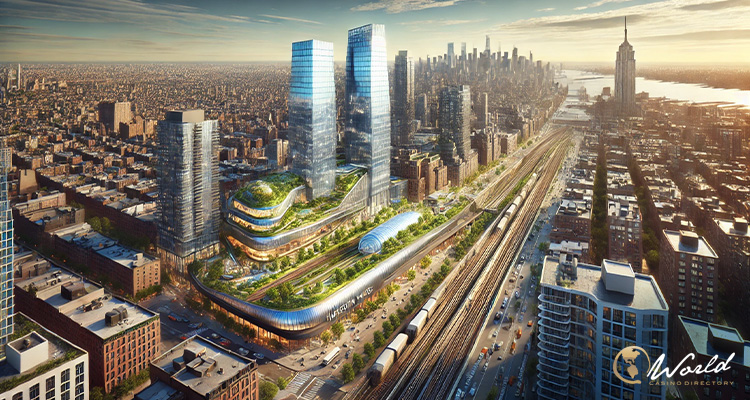The bid to build a casino in the Hudson Yards district of Manhattan, New York, has taken a significant step forward. In a key decision by the City Planning Commission (CPC), the proposal to transform the Western Rail Yards into a mixed-use development, including a casino, housing, and public green spaces, has received preliminary approval. On Wednesday, April 9, the commission voted overwhelmingly in favor of amending zoning laws to support the construction of the project. The development, which involves a partnership between Related Companies, Oxford Properties Group, and Wynn Resorts, now finds itself one step closer to becoming a reality.
Details of the Commission’s vote:
The vote by the CPC clears the way for the proposed development at the Western Rail Yards, located between 11th and 12th Avenues, and 30th and 33rd Streets, near the High Line park. While the commission’s approval pertains mainly to zoning changes, it signals the project’s viability in the competitive process for a gaming license. “Our vote is on land use actions to allow for this site to compete with other regional applications for a gaming license,” said Dan Garodnick, Chair of the CPC. However, the broader and more complex decision on whether to approve a casino at this site remains in the hands of state authorities.
Notably, the application calls for reducing the originally proposed housing units by 3,000, shifting focus toward more commercial spaces. This decision was driven by the realization that funding the project through luxury condos, as was initially planned in 2009, was no longer feasible. Despite this change, the developers are keen to preserve the number of affordable housing units initially agreed upon.
One of the key selling points of the proposal is the expected benefits for the local community and the Metropolitan Transportation Authority (MTA). The developers have pledged that 1% of the casino’s gross gaming revenue will go toward community organizations, particularly those in Chelsea, Hell’s Kitchen, and the West Side of Manhattan. In addition, the casino is projected to generate substantial funds for the MTA, which is facing significant financial challenges.
The project is expected to provide up to $2.7 billion in revenue for the MTA, which would help fund crucial transit projects. “This development is also projected to generate $2.7 billion in revenue for the MTA, providing a much-needed boost for public transit at a time of fiscal uncertainty,” a project spokesperson noted. Furthermore, the development plans to contribute multi-million-dollar payments to the MTA through rental payments, dedicated sales taxes, and other revenue streams.
The opposition and community concerns:
Despite the approval from the CPC, the proposal has generated significant opposition, particularly from local groups and residents. Friends of the High Line, a nonprofit organization advocating for the preservation of the High Line park, strongly opposes the casino plan, arguing that it will diminish open space in the area. Acording to amNew York, Alan van Capelle, the group’s executive director, urged Related Companies to reconsider its proposal. “The community has spoken. It’s time for Related to do the right thing—drop this flawed proposal and work with the community to develop a plan that actually serves the people who live and work here,” van Capelle said.
The local Manhattan Community Board 4 (MCB4) had already voted against the casino, with 39 votes against the proposal and one abstention. Furthermore, several City Planning Commission members expressed concerns about the reduction in housing and the impact on the High Line’s surroundings. Commissioner Raju Mann was particularly vocal, suggesting that a more balanced approach could be achieved where the developers could build a profitable commercial space without sacrificing the housing and design integrity originally planned.
With the CPC’s approval now in place, the matter moves to the City Council, where Councilmember Erik Bottcher, representing the local district, is expected to play a crucial role. Advocates for and against the project are already intensifying their efforts to influence his decision. Supporters of the project, including Related Companies, have organized efforts to sway Bottcher, sending nearly 2,000 postcards and making over 800 calls to his office in support of the plan.
The City Council has 60 days to vote on the rezoning proposal, which will then pave the way for a broader decision on whether to award a gaming license to the project. If the Council approves the rezoning, the final step will involve a six-person Community Advisory Committee, which includes key political figures such as Governor Kathy Hochul, Mayor Eric Adams, and State Senator Brad Hoylman-Sigal. The gaming license decision, expected later this year, will ultimately determine if the casino becomes part of the Hudson Yards vision.



